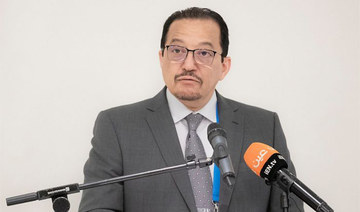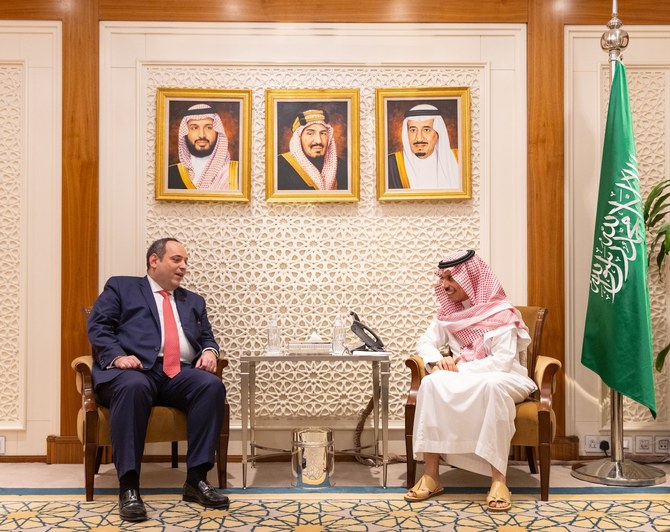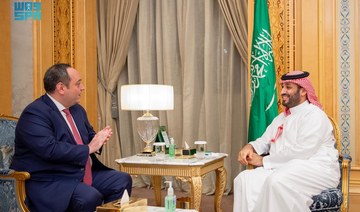JEDDAH: The COVID-19 pandemic has had many effects on global society that have been damaging and detrimental to populations and economies. But some of the ways in which nations have responded to the challenges it created have brought undoubted benefits that will help to shape the future.
In Saudi Arabia, for example, as in other countries, the unprecedented acceleration of the digitalization process within the education system has meant great advancements in remote learning, and the enhanced use of technology has resulted in revolutionary improvements in traditional schooling.
The Saudi Ministry of Education believes that a hybrid model for learning is the future. Since the start of the pandemic it has taken exceptional steps to develop and promote the use of electronic-learning platforms. These included the swift launch of iEN, the national education portal, in the early days of the crisis for more than 6 million users. The ministry also recently announced a plan to replace physical books with tablets at Saudi schools in the next academic year.
With the help of the various tools technology can provide, the educational experience will be more feasible and will become stronger.
Mohammad Al-Ghazal, Expert in digital transformation
However this global shift toward the enhanced use of technology in schools creates challenges as well as opportunities. A recent survey by software company Citrix found that 81 percent of educators in Saudi Arabia think hybrid learning will improve the experience of students in the coming academic year, and that they expect investment in up-skilling and communication tools.
The survey, the results of which were published in June, aimed to identify the challenges and opportunities that have arisen from the major changes in education over the past 18 months, along with the views of the people at all levels in the sector, including university executives, information technology managers, teachers and administrators.

Since the start of the pandemic, remote learning has accounted for almost 80 percent of all teaching provided by schools and universities in the Kingdom. About 70 percent of those surveyed said that flexible/remote learning was important for their school or university.
The participants highlighted concerns about the technical issues associated with remote learning, such as problems connecting with video-conferencing platforms (51 percent), a lack of devices connected to the education portal (33 percent), and security issues (31 percent).
Communication difficulties was another major concern, with more than half of those surveyed saying that communication between teachers and students using collaboration tools needs to be improved. Other challenges related to accessibility and the lack of a single platform providing all materials.
HIGHLIGHTS
• Since the start of the pandemic, Saudi Education Ministry has taken exceptional steps to develop and promote the use of electronic-learning platforms. These include the swift launch of iEN, the national education portal.
• Remote learning has accounted for almost 80 percent of all teaching provided by schools and universities in the Kingdom. About 70 percent of those surveyed said that flexible remote learning was important for their school or university.
Despite the apparent acceptance of the importance of a hybrid model, 90 percent of participants said that in-person learning will be most important to their schools and universities post-pandemic, while 38 percent believe that the “smart campus” will be an important concept.
Experts believe the Kingdom’s experience during the pandemic has provided the building blocks for a national transformation.
“Although Saudi Arabia already had been steadily accelerating development of its connectivity infrastructure in recent years, in light of Vision 2030 goals, significant momentum was achieved during 2020,” Mohammad Al-Ghazal, an expert in digital transformation, told Arab News.

He said the experience the communication sector has gained during the pandemic will provide a great foundation for the new era. For example collaboration between various authorities has been enhanced, he said, and new mechanisms have been developed that put in place essential pillars for a comprehensive digital transformation that places the Kingdom among the global pioneers in this area.
The virtual experience was forced upon students and teachers by the health crisis, he said, and has highlighted many issues and challenges related to technical literacy, security and communication. However, it will ultimately lead to improvements that benefit the country’s education sector, he added.
Al-Ghazal highlighted some of Saudi Arabia’s significant recent achievements in developing a robust digital framework.

Mohammad Al-Ghazal
The Kingdom last year ranked fifth on the Speedtest Global Index of countries with the fastest mobile internet networks, an improvement of five places in a year and 11 places since 2018. It ranked second in the world in its commitment to cybersecurity, according to the Global Cybersecurity Index 2020.
In addition, the annual global competitiveness report published by the International Institute for Administrative Development ranked the country seventh in terms of funding for technological development and ninth for the development and appliance of technology.
This robust digital infrastructure has helped Saudi Arabia to cope with the disruptions caused by the pandemic to the public and private sectors, Al-Ghazal said.
He believes the arguments made by some that an increasing reliance on digital tools in traditional education is causing disadvantages or harm are “useless and out of context.”
“Resistance to new technologies will be unfair to the young digital ‘netizens,’ who deserve to have a well-developed educational system that adapts to their lifestyle and helps prepare them to the increasing demands of the workplace,” Al-Ghazal said.
He believes that although the digital transformation of education is still at an early stage, the Kingdom is well placed because all the necessary elements are in place.
“However, the true challenge is cultural,” he said, adding that the development of a virtual culture in schools and universities will require imaginative and creative ideas, open leadership and a spirit of innovation. Such a radical cultural change requires long-term planning, he added.

Long-term challenges facing the adoption of hybrid learning include issues related to health and well-being, concentration, effective communication between educators and students, the sustainability of solutions and improvements, and the development and enhancement of technical knowledge among staff.
Nearly 45 percent of people surveyed by Citrix said the class experience could be improved by helping educators to improve their ability to use the technology, and 28 percent said that technical skills and training are the biggest post-pandemic challenges facing schools and universities.
“We need a lot of re-skilling of educators and staff,” said Al-Ghazal. “This has to change on a cultural level and at a managerial level; the managerial approach toward education has to change.”
Therefore attitudes and approaches to teacher training need to change immediately, he added.
“There is an urgent need for a comprehensive cultural change,” he said. “The market is changing; therefore the educational system and culture must change, too. To adapt to the new normal, students need to acquire soft skills — learn how to find information, not memorize it — which will make them more valuable to the workforce later on.”
Al-Ghazal said that the technology used to aid learning should not be seen merely as a tool but as an academic opportunity. Therefore, concepts such as instructional design, multimedia production and data analytics are vital for the future of education, he added.
“With the help of the various tools technology can provide, the educational experience will be more feasible, will become stronger, different, and the student will be acquiring soft skills from a young age,” he said.
Through the use of virtual reality and augmented reality, students will have the unprecedented opportunity to gain wider exposure to experiences that can raise awareness, develop emotional intelligence, enhance their senses, and improve their observational and critical-thinking skills, Al-Ghazal said.
“An example of this would be having a wide variety of options for school trips,” he explained. “Using virtual and augmented-reality technologies, geography students can visit a site in Riyadh from their classrooms in Dammam any time,” he said by way of an example.
Therefore the increased and smarter use of technology will not only make education more beneficial, more interactive, and a richer and more sophisticated experience, it can also reduce costs and provide a safer environment for young students.
“It is cost-saving while not depriving students of enriching experiences that were unobtainable in the traditional educational system,” said Al-Ghazal. “It might sound expensive but it actually will save a lot of costs and provide a better-quality education.”
Scholars and educators of all disciplines need to be effectively motivated, properly guided and well equipped for the evolution of education, he said, because: “This is only the beginning but the future is bright. We have to adapt to the new normal and contribute to making it flourish — there is no going back.”


























